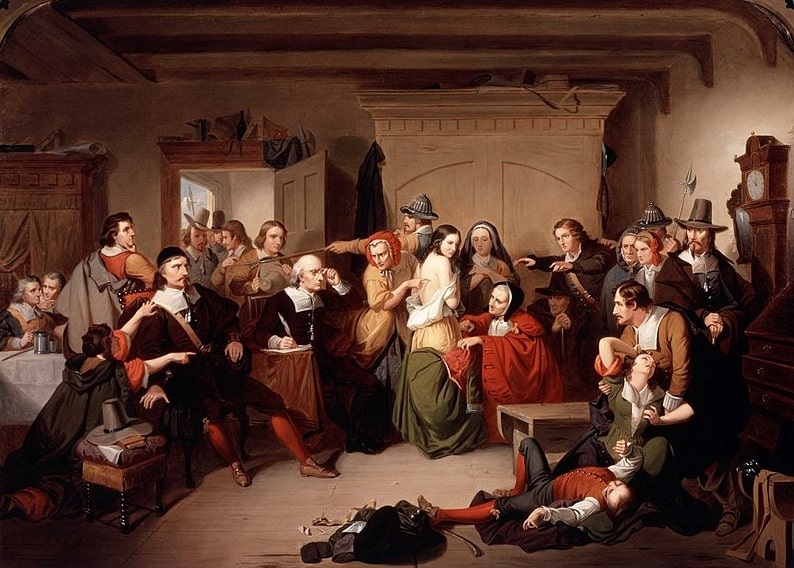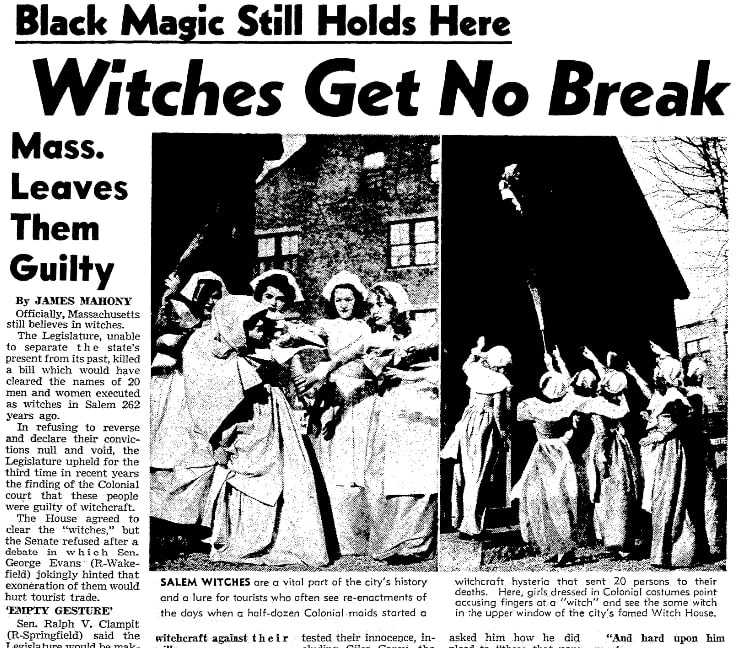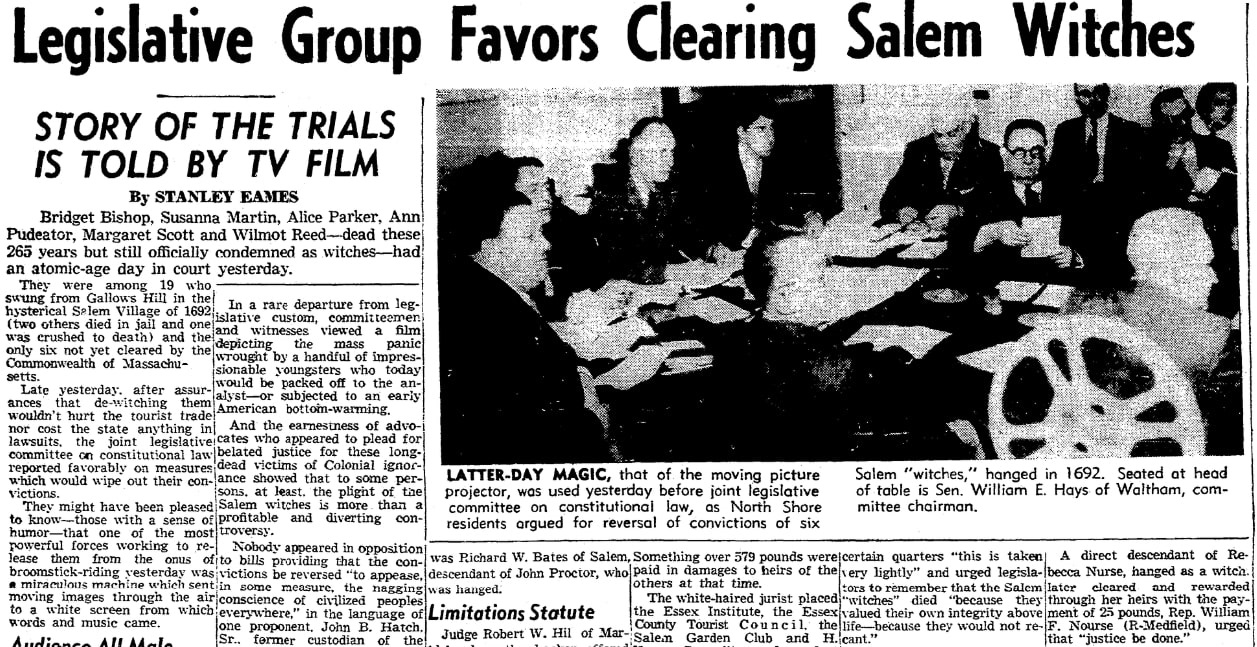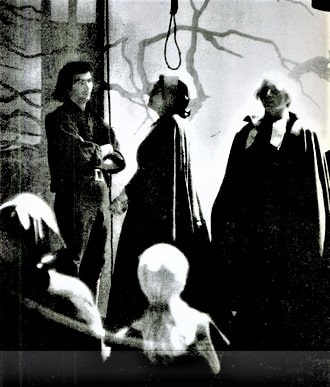Introduction: In this article, Melissa Davenport Berry writes about efforts in the Massachusetts Legislature to clear the names of the victims found guilty of witchcraft in the Salem trials of 1692-93. Melissa is a genealogist who has a blog, AnceStory Archives, and a Facebook group, New England Family Genealogy and History.
In search for the skinny on the Salem witch trials of 1692-93, a Boston Traveler article from 1954 caught my attention.

There were several attempts made to pass a bill before the Massachusetts Legislature to clear the names of the victims found guilty of witchcraft in the Salem trials of 1692-93. These attempts were killed in one form or another several times, but eventually all the accused were cleared.

This article reported:
Officially, Massachusetts still believes in witches.
The Legislature, unable to separate the state’s present from its past, killed a bill which would have cleared the names of 20 men and women executed as witches in Salem 262 years ago.
In refusing to reverse and declare their convictions null and void, the Legislature upheld for the third time in recent years the finding of the colonial court that these people were guilty of witchcraft.
The House agreed to clear the “witches,” but the Senate refused after a debate in which Sen. George Evans (R-Wakefield) jokingly hinted that exoneration of them would hurt tourist trade.
Sen. Ralph V. Clampit (R-Springfield) said the Legislature would be making an empty gesture since the convictions were under British colonial rule.
Rep. Nathaniel Tilden (R-Scituate) raised a point involving the question of whether there is a statute of limitations on ghosts.
He said one of his constituents, whom he did not name, was “fearful the declaration of innocence might cause him to be liable for suit due to the actions of his ancestors.”
Tilden said the brother of this man’s great-great-great-great-great grandfather took an active part in the hangings and later sold the belongings and bodies [that seems farfetched] of some of the victims, keeping the “proceeds for his own use.”
Tilden did not say so, but one of the women whose belongings and body were peddled might have been the ancestor of one of his House colleagues.
For Rep. William F. Nourse (R-Medfield) is a descendant of one of the women hanged, a Rebecca Nourse [also spelled Nurse] of Salem.
She and 19 others were put to death in the witchcraft hysteria that began when some colonial juvenile delinquents tried to escape punishment.
Here is another attempt the Massachusetts Legislature made in 1957, as reported in the Boston Herald.

This article reported:
Bridget Bishop, Susanna Martin, Alice Parker, Ann Pudeator, Margaret Scott, and Wilmot Reed – dead these 265 years but still officially condemned as witches – had an atomic-age day in court yesterday.
They were among 19 who swung from Gallows Hill in the hysterical Salem Village of 1692 (two others died in jail and one was crushed to death) and the only six not yet cleared by the Commonwealth of Massachusetts.
Late yesterday, after assurances that de-witching them wouldn’t hurt the tourist trade nor cost the state anything in lawsuits, the joint legislative committee on constitutional law reported favorably on measures which would wipe out their convictions.
They might have been pleased to know – those with a sense of humor – that one of the most powerful forces working to release them from the onus of broomstick-riding yesterday was a miraculous machine which sent moving images through the air to a white screen from which words and music came.
And the shade of Ann Pudeator, whose persecutors would not believe her kitchen-jars held only grease for soapmaking, would have been interested to learn that the machine interrupted its story to sell cosmetics.
It was no sale – except for two reporters, the audience was all male – but a TV film, “Satan in Salem,” argued powerfully the case advanced by witnesses in a jammed hearing room at the State House.
In a rare departure from legislative custom, committeemen and witnesses viewed a film depicting the mass panic wrought by a handful of impressionable youngsters who today would be packed off to the analyst – or subjected to an early American bottom-warming.
And the earnestness of advocates who appeared to plead for belated justice for these long-dead victims of Colonial ignorance showed that to some persons, at least, the plight of the Salem witches is more than a profitable and diverting controversy.
Nobody appeared in opposition to bills providing that the convictions be reversed “to appease, in some measure, the nagging conscience of civilized peoples everywhere,” in the language of one proponent, John B. Hatch Sr., former custodian of the Salem “Witch House.”
Hatch, who has made a 35-year study of the witchcraft trials, voiced the opinion that the Legislature alone would be futile in clearing the names of witch hunt victims. The only redress, he contented, is through Queen Elizabeth of England, since witchcraft is heresy and subject only to canonical law. He wanted the legislature to memorialize Congress to “promote an international meeting of minds” on the subject.
Allied with him on this stand was Richard W. Bates of Salem, descendant of John Proctor, who was hanged.
According to Wikipedia:
“In November 2001, years after the celebration of the 300th anniversary of the trials, the Massachusetts Legislature passed an act exonerating all who had been convicted and naming each of the innocent, with the exception of Elizabeth Johnson, who was cleared by the Massachusetts Senate on 26 May 2022, the last conviction to be reversed, after pressure from schoolchildren who discovered the anomaly.”

Life Magazine published a story in March of that year on the meetings at the State House entitled “No Legal Switch to Clear a Witch.” The TV film “Satan in Salem” is not online, but is part of the Frank De Felitta Collection housed at the Writers Guild Foundation Archive in Los Angeles, California.
To be continued…
Note on the header image: Witchcraft trial at Salem Village. The central figure in this 1876 illustration of the courtroom is usually identified as Mary Walcott. Credit: Wikimedia Commons.
Explore over 330 years of newspapers and historical records in GenealogyBank. Discover your family story! Start a 7-Day Free Trial.
Related Articles:

Melissa,
Thank you for all your research on the Salem Witch Trials. My direct ancestor is Samuel Wardell. Have you researched his story? Hope that you will do so if you haven’t. I am in possession of the book “The Salem Witch Trials” by Marilynne K. Roach.
Thank you Charlene! I have an Andover, MA, Wardwell as well in my line. I love Roach’s book. Stay tuned, I will have more coming in 2024!